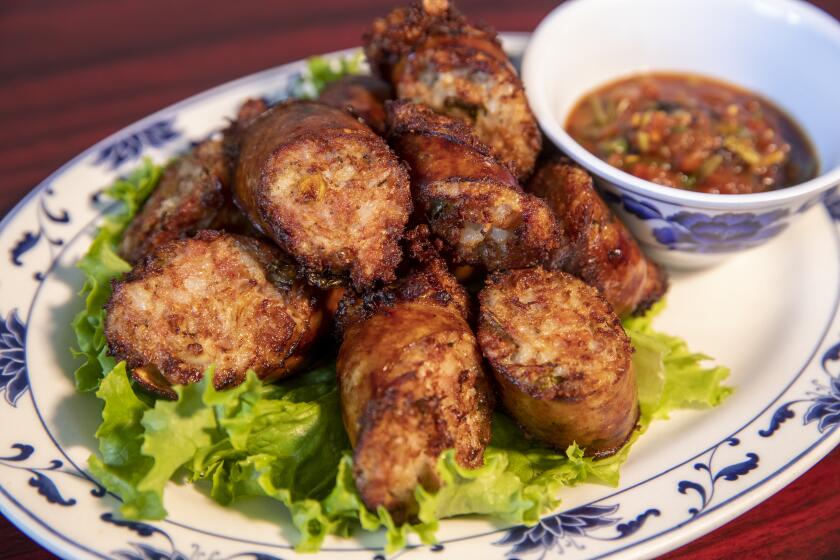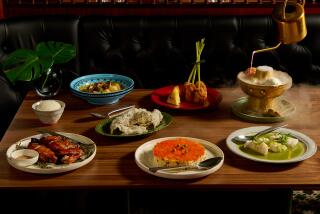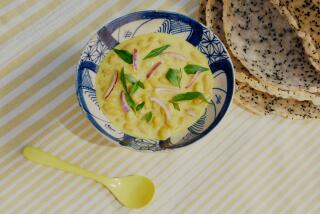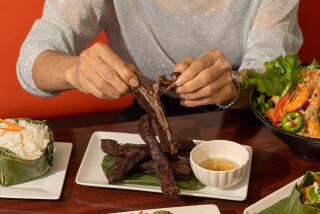The Laotian fish curry fit for royalty
Sheatfish, a type of wild catfish found in the Mekong River, is traditionally used in this curry — one of several traditional recipes preserved in “Traditional Recipes of Laos,” a cookbook containing recipes for chef Phia Sing’s royal dishes — because it’s what’s available in Laos. Here, though, use catfish, tilapia or any kind of thin white fish fillets. As with most cooking in Southeast Asia, the aromatics in this curry are cooked in the fatty cream that rises to the surface when making fresh coconut milk. Using canned coconut milk is much simpler; just remember to refrigerate the cans overnight (or chill in the freezer for 20 minutes) to firm the fat at the top so it’s easy to scoop off when you open the can. Also, the potatoes in this curry are optional. They make a heartier curry, but if you want, leave them out and simply simmer the curry for 12 minutes in Step 5 to marry its flavors before cooking the fish.
Laotian cuisine can be hard to find, but it’s certainly worth the search. Get your Lao food fix at these four places in and around Los Angeles.
Kale Pa Sa Ngoua (Laotian Sheatfish Curry)
45 minutes. Serves 4.
Ingredients
- 2 cans unsweetened full-fat coconut milk (14 ounces each), chilled
- 2 sprigs cilantro, stems removed
- 6 small shallots, roughly chopped
- 4 inches fresh ginger, peeled and very thinly sliced across the grain
- 3 tablespoons mild curry powder
- 1 tablespoon tomato paste
- 2 cups fish stock or chicken stock
- 1 pound russet or gold potatoes, peeled and cut into ½-inch pieces
- 3 red Thai chiles
- 10 ounces catfish, tilapia or Dover sole fillets (about 5), cut into quarters
- Crushed red chile flakes, to taste
- Fish sauce, to taste
- Thinly sliced scallions, to garnish
- Cooked white rice, for serving
Instructions
- Open the cans of coconut milk and carefully skim off the top layer of cream until you get ½ cup (1 can’s worth of cream should suffice). Pour the liquid milk into a liquid measuring cup and add more milk from the second can until you have 1 ½ cups. Scrape the coconut cream into a medium saucepan.
- Pour the coconut milk into a small saucepan. Finely chop half the cilantro leaves and add them to the coconut milk. Place the small saucepan over medium-high heat and bring the coconut milk to a simmer. Once it starts bubbling, reduce the heat to low to keep warm.
- Meanwhile, combine the shallots and ginger in a mortar and pestle and pound until they form a uniform paste (alternatively, blend them together in a food processor).
- Heat the medium saucepan with the coconut cream over medium-high heat until the fat and cream start to separate from each other. Scrape the shallot-ginger paste into the pan and cook, stirring occasionally, until the aromatics start sticking and the coconut solids just start to lightly brown on the bottom of the pan, 5 to 6 minutes. Add the curry powder and cook, stirring, until toasted, about 1 minute. Stir in the tomato paste and cook, stirring, for another minute. Pour in the stock and scrape the bottom of the pot as you stir until the liquid comes to a boil.
- Pour the warm coconut milk into the curry mixture, add the potatoes and Thai chiles and bring to a boil. Reduce the heat to maintain a gentle simmer and cook the potatoes until almost done, about 12 minutes. Add the fish, season the liquid with chile flakes and fish sauce to taste and cook, stirring occasionally, until the fish is just cooked through and the tip of a paring knife inserted in each potato piece slides in and out easily, 4 to 5 minutes more. Remove the pan from the heat and season with more fish sauce, if you like.
- Spoon the curry over rice to serve and garnish with scallions and the remaining cilantro leaves.
A trip to the former royal capital of Laos and an exploration of the history of the cooking there, preserved through one unlikely cookbook and the efforts of chefs today.
More to Read
Eat your way across L.A.
Get our weekly Tasting Notes newsletter for reviews, news and more.
You may occasionally receive promotional content from the Los Angeles Times.












